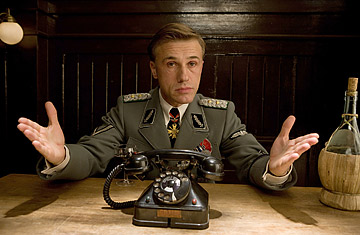
Christoph Waltz spent 30 years acting any which way he could. He acted in movies, he acted on television, he acted on the stage, and after all that time, it was Quentin Tarantino, the master of casting familiar actors in revelatory roles (see John Travolta, Kurt Russell, Robert Forster), who gave Waltz his juiciest piece of work. As Colonel Hans Landa, the "Jew hunter" of last year's World War II spaghetti western Inglourious Basterds, the 53-year-old Austrian delivered a charmingly evil performance. He is the favorite to win this year's Best Supporting Actor Oscar.
TIME: What is it like to receive all these awards? Does it even matter if you get an Oscar, or is the praise enough?
Waltz: Praise is nothing that accumulates. Praise is a sequence, especially if you've toiled for a long time. Praise does not pile up. So in a way, you can't get too much. I don't consider it to be a quantity that you can measure by volume. There's a new aspect to the appreciation and the acknowledgment every time, because it's always coming from somewhere else. So I try to take the praise very specifically, because then I really can utilize it as an encouragement. It's like a finger that points in a certain direction. I take praise as not just a reward and a result but also as the beginning of a new process.
If this role hadn't come along, would you still be an actor? Would you still believe in the craft?
I probably would still be an actor, because this is what I make a living doing, and I have been making a living with it for so long. To chuck it all in and start something else — it's a bit too late. Would I still believe in the craft? Absolutely, but on my terms, and that's where the difficulty would set in. It would feel like fighting a lost cause. But because I'm so bloody stubborn, I would fight it anyway.
But all of a sudden — with the emphasis on sudden — it looks like it's not a lost cause. It looks like I was not traveling on the wrong steamship in the wrong direction. So in a way, after 30-something years, it's more than gratifying, it's more than just an accolade. It's really like a new start.
How did you and Quentin interact?
We discussed the character as if we were reconstructing his past. Quentin doesn't work by instruction. He works by inspiration. He has an absolute unique talent of inspiring everyone around him to not only do their best but do things that are in his best interest. How does he do that? I think he has a secret magic wand or something.
What did you think about Quentin's script?
You could teach a whole course on it. It comprises so many levels of everything. There's the literary, the poetic, the philosophical, the psychological, the historical, the anthropological. You could spread this script throughout all the departments of an Ivy League university and have legions of students work for years on it. Maybe I'm exaggerating. I might get carried away.
There were two things that I had to watch out for [when I read the script]. First of all, not to ever panic. The other thing was to disregard the Nazi aspect. I put on the uniform, and that's taken care of by the costume designer. And [ignoring the Nazi part] was not easy to do, especially growing up in Austria, because there, you are inundated with information about this era.
Why did you want to ignore the Nazi aspects?
My opinion about it would have interfered with the character. What I know about it is historical information. A person who lived in 1944 didn't have the historical evaluation of this whole event, this whole catastrophe, this whole disaster. Also, for the character himself, I thought it was not that relevant. I found him very early on to be nonideological. He's a detective. He's not really a Nazi. He's just wearing the uniform.
